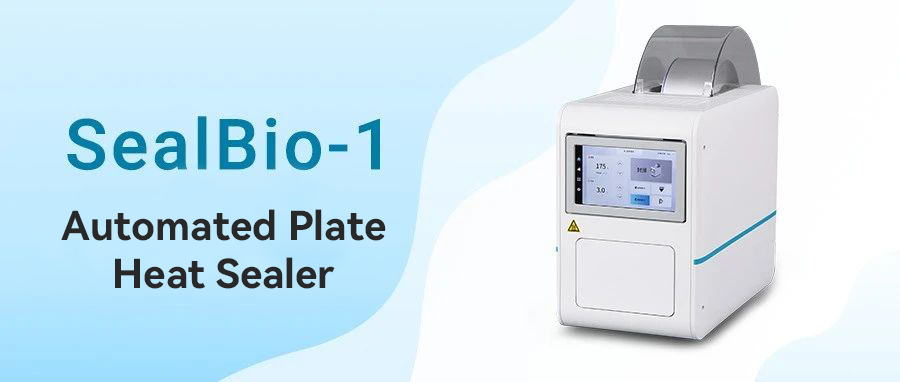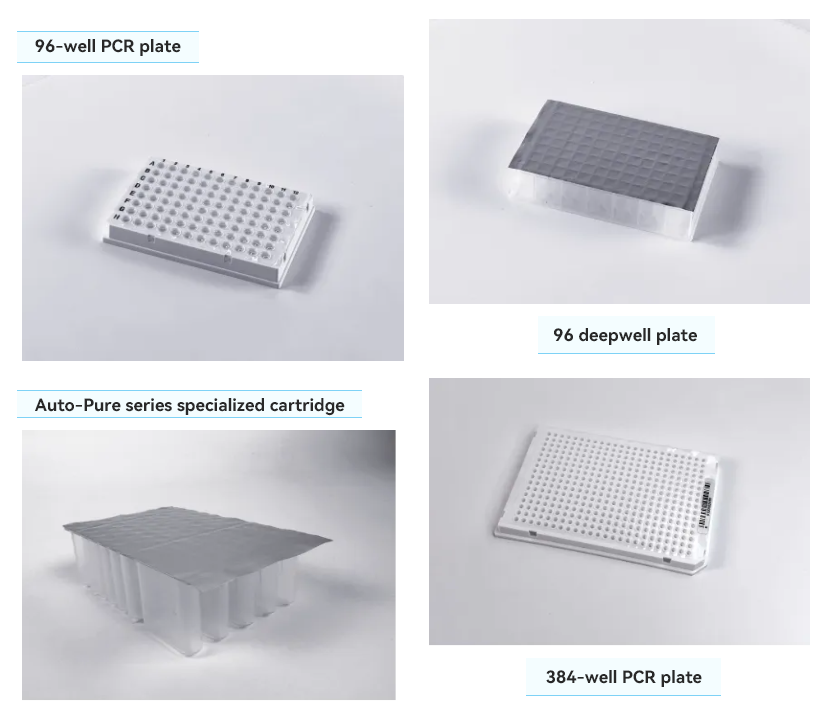Heat sealing is the "gold standard" method for sealing various well plates in the field of biomedicine. Common well plates include different types of PCR plates, sample storage deepwell plates, nucleic acid extraction deepwell plates, ELISA plates, and cell culture plates. The plate sealer seals the plate by heating to prevent sample or reagent evaporation and contamination.
In practical applications, compared to the methods of sealing and adhesive film, heat sealing film can more effectively reduce the loss caused by sample volatilization and prevent cross-contamination, showing greater advantages in time and economic costs.
SealBio-1 can be adapted to ANSI, SBS standard plates with height range of 3~62mm. It supports the use of 78-82mm heat sealing roll film. It also supports sealing of Auto-Pure series large-volume specialized cartridges. It can be widely used in application scenarios such as pre-filled reagents, sealing film before PCR, and sample preservation.


Performance Testing
① Take 10×96 deepwell plates and weigh the empty plates on a balance (unit: g)
② Add 400μL of 80% ethanol to each well in plates 1 and 2, and weigh the plate + ethanol
③ Add 600μL of 80% ethanol to each well in plates 3 and 4, and weigh the plate + ethanol
④ Add 700μL of ultrapure water to each well in plates 5-10 and weigh them
⑤ After weighing, transfer to the SealBio-1 automated plate heat sealer for sealing, and weigh the total mass after sealing
⑥ Transfer to an environment with 45℃ and 50% humidity for 72 hours, with 1, 3, 5, 7, and 9 placed upright and 2, 4, 6, 8, and 10 inverted
Take out the weight and record the total mass
Table 1 Test Data of SealBio-1 Automated Plate Heat Sealer
No. | Empty plate weight | Plate + liquid weight | Total weight after sealing | Total weight after processing | Difference |
1 | 98.7391 | 132.3205 | 132.8870 | 132.8191 | -0.0679 |
2 | 98.6991 | 132.6491 | 133.2218 | 133.1604 | -0.0614 |
3 | 99.9472 | 150.3822 | 150.9489 | 150.9005 | -0.0484 |
4 | 99.0249 | 150.3385 | 150.9034 | 150.8503 | -0.0531 |
5 | 98.7439 | 163.6300 | 164.1943 | 164.1267 | -0.0676 |
6 | 98.7335 | 163.7393 | 164.3057 | 164.2672 | -0.0385 |
7 | 99.0522 | 164.0015 | 164.5680 | 164.5325 | -0.0355 |
8 | 98.7862 | 163.6128 | 164.1784 | 164.1438 | -0.0346 |
9 | 99.1080 | 164.1856 | 164.7530 | 164.7145 | -0.0385 |
10 | 99.4039 | 164.2744 | 164.8375 | 164.7965 | -0.0410 |
The test results show that the weight reduction of 80% ethanol and pure water in both upright and inverted sealed deepwell plates is less than 0.1g. SealBio-1 automated plate heat sealer, equipped with a puncturable aluminum film, has a good sealing effect on deepwell plates and can meet the sealing storage requirements of reagents or samples and other types of liquids.
Common Application Scenarios
1 Molecular Biology
PCR experiment: used to seal PCR plates to prevent sample evaporation or contamination, ensuring the accuracy of amplification reactions.
DNA/RNA sequencing: seal the sample plate before sequencing to avoid sample degradation or contamination.
2 Cell Culture
Cell culture plate sealing: during cell culture, sealing the culture plate prevents evaporation and contamination of the culture medium, ensuring a stable environment for cell growth.
Long term storage: seal the cell culture plate for long-term preservation to avoid sample inactivation or contamination.
3 Drug Screening
High-throughput screening: seal the microplate in drug screening to prevent sample evaporation or cross-contamination, ensuring the reliability of experimental results.
Compound storage: seal the compound storage plate to ensure the stability of the compound during storage.
4 Clinical Diagnosis
ELISA experiment: seal the microplate in the ELISA experiment to prevent sample evaporation or contamination, ensuring accurate detection results.
Blood/urine sample storage: seal the sample plate to ensure that the sample is not contaminated or evaporated before testing.
In addition, automated plate heat sealers are widely used in microbiology, vaccine development, biological sample banks, food safety testing, environmental monitoring, proteomics research, and long-term experiments.
SealBio-1 is a standard microplate sealing design that can meet the requirements of efficient, stable, and reliable sealing. It can be used not only in the laboratory but also integrated into automated systems.

 Biological Sample Preparation
Biological Sample Preparation
 Life Science Detection Products
Life Science Detection Products
 POCT Detection & Reagent
POCT Detection & Reagent
 Automation & Liquid Handling
Automation & Liquid Handling
 Laboratory Instrument
Laboratory Instrument
 Reagent & Consumable
Reagent & Consumable
 Others
Others
 OEM/ODM
OEM/ODM












 Release time:2025-07-16
Release time:2025-07-16
 Source:
Source:
 Pageviews:845
Pageviews:845











 + 86 571-88859758
+ 86 571-88859758 sales@allsheng.com
sales@allsheng.com



